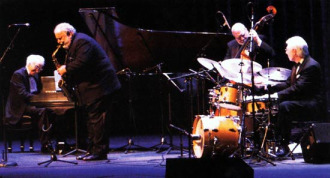main: September 2009 Archives
Following the Compatible Quotes entry two exhibits down, several Rifftides readers -- literate bunch that you are -- responded extolling the grandfather of all autumnul rhapsodies of the past two centuries. By popular request, here it is.
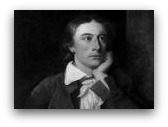
John Keats (1795-1821)
SEASON of mists and mellow fruitfulness,
Close bosom-friend of the maturing sun;
Conspiring with him how to load and bless
With fruit the vines that round the thatch-eaves run;
To bend with apples the moss'd cottage-trees,
And fill all fruit with ripeness to the core;
To swell the gourd, and plump the hazel shells
With a sweet kernel; to set budding more,
And still more, later flowers for the bees,
Until they think warm days will never cease;
For Summer has o'erbrimm'd their clammy cells.
Who hath not seen thee oft amid thy store?
Sometimes whoever seeks abroad may find
Thee sitting careless on a granary floor,
Thy hair soft-lifted by the winnowing wind;
Or on a half-reap'd furrow sound asleep,
Drowsed with the fume of poppies, while thy hook
Spares the next swath and all its twinèd flowers:
And sometimes like a gleaner thou dost keep
Steady thy laden head across a brook;
Or by a cyder-press, with patient look,
Thou watchest the last oozings, hours by hours.
Where are the songs of Spring? Ay, where are they?
Think not of them, thou hast thy music too,--
While barrèd clouds bloom the soft-dying day
And touch the stubble-plains with rosy hue;
Then in a wailful choir the small gnats mourn
Among the river-sallows, borne aloft
Or sinking as the light wind lives or dies;
And full-grown lambs loud bleat from hilly bourn;
Hedge-crickets sing; and now with treble soft
The redbreast whistles from a garden-croft;
And gathering swallows twitter in the skies.
Indian Summer is glorious in this precinct of the northern hemisphere. Skies are cloudless. The mountains stand out crisply on the horizon. Daytime temperatures are in the 80s and 90s, dropping to the high 40s at night. That makes for red apples and great wine crushes in the vineyards. The fine weather also makes for happy cyclists. On my velocipede tour of the valley today, the meteorological perfection brought to mind the song Victor Herbert named for this season. A web search unearthed more than 40 YouTube pages with clips titled "Indian Summer." It turns out that there are a lot more songs by that name than Herbert's; rock, folk, salsa, I don't know what all. I sampled them, and I'm going to do you the favor of not relaying them. Instead, you get two versions of the real thing. The first clip features Sarah Vaughan with the Count Basie Orchestra minus Basie. He died in 1984, Sarah in 1990. Here, she is in splendid voice, as she was until nearly the end.
the 80s and 90s, dropping to the high 40s at night. That makes for red apples and great wine crushes in the vineyards. The fine weather also makes for happy cyclists. On my velocipede tour of the valley today, the meteorological perfection brought to mind the song Victor Herbert named for this season. A web search unearthed more than 40 YouTube pages with clips titled "Indian Summer." It turns out that there are a lot more songs by that name than Herbert's; rock, folk, salsa, I don't know what all. I sampled them, and I'm going to do you the favor of not relaying them. Instead, you get two versions of the real thing. The first clip features Sarah Vaughan with the Count Basie Orchestra minus Basie. He died in 1984, Sarah in 1990. Here, she is in splendid voice, as she was until nearly the end.
The second clip is from an Art Ford's House Party telecast from Newark, New Jersey, in 1958. Coleman Hawkins is the tenor saxophonist. Willie The Lion Smith may seem an unlikely accompanist for Hawkins, but there he is, a bit uncertain of the chord changes. Vinnie Burke is on bass, Dicky Thompson on guitar. Sonny Greer is the drummer, out of camera range. We get a glimpse of singer Mae Barnes sitting in the background and hear a bravura note from Charlie Shavers' trumpet at the end.
Delicious autumn! My very soul is wedded to it, and if I were a bird I would fly about the earth seeking the successive autumns. -- George Eliot
Then summer fades and passes and October comes. We'll smell smoke then, and feel an unexpected sharpness, a thrill of nervousness, swift elation, a sense of sadness and departure. -- Thomas Wolfe
When an early autumn walks the land and chills the breezeand touches with her hand the summer trees,
perhaps you'll understand what memories I own.
There's a dance pavilion in the rain all shuttered down,
a winding country lane all russet brown,
a frosty window pane shows me a town grown lonely.
That spring of ours that started so April-hearted,
seemed made for just a boy and girl.
I never dreamed, did you, any fall would come in view
so early, early.
Darling if you care, please, let me know,
I'll meet you anywhere, I miss you so.
Let's never have to share another early autumn.
-- Johnny Mercer
Yakima, Washington
The recent CD by pianist Bill Anschell and soprano saxophonist Brent Jensen is 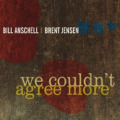 called We Couldn't Agree More. The title is inaccurate. In an intimate concert last weekend at The Seasons, they were in even greater agreement, with more daring and more complexity.
called We Couldn't Agree More. The title is inaccurate. In an intimate concert last weekend at The Seasons, they were in even greater agreement, with more daring and more complexity.
The duo's approach is to play well-known tunes without well-known routines; no arrangements, no obvious statement of melody, no predetermined tempos or key signatures. They call on their experience, ears and reflexes. That may read like a description of free jazz at its freest, but Jensen and Anschell operate in standard song forms. "We never play a tune the same way twice," Anschell told the audience, "and we never know which way it's going to go." At The Seasons, Jensen made the first move after Anschell said he had no idea what tune his partner had chosen. Jensen began improvising on his curved soprano. Anschell listened intently as Jensen played nowhere near the melody on the chords of "It Could Happen To You." After a chorus, Anschell slid in under him with counterpoint. They were off and running through a program that also included "Autumn Leaves," "I'm Old Fashioned," "Squeeze Me," "All Of You," "Willow Weep For Me," "Beautiful Love" and an Anschell composition, "Dreamscape."
after Anschell said he had no idea what tune his partner had chosen. Jensen began improvising on his curved soprano. Anschell listened intently as Jensen played nowhere near the melody on the chords of "It Could Happen To You." After a chorus, Anschell slid in under him with counterpoint. They were off and running through a program that also included "Autumn Leaves," "I'm Old Fashioned," "Squeeze Me," "All Of You," "Willow Weep For Me," "Beautiful Love" and an Anschell composition, "Dreamscape."
"Squeeze Me" developed into an exercise in rubato--squared. With no bassist or drummer to dictate time, the tempo sped, slowed and undulated. At moments it seemed in suspension, and yet the two were swinging. "All Of You" was laced with similar interior time play, further convoluted by stop-time anticipation of one another's phrases and Anschell's broken metre in the left hand. Quotes abounded through the set, none more amusing than Jensen's paraphrase of "Straight No Chaser" as he and Anschell simultaneously diverted "I'm Old Fashioned" through the West Indies for a calypso interlude.
Jensen set up a tune with phrases that seemed headed toward "Have You Met Miss Jones?" but it turned out to be "Willow Weep For Me" and included a startling series of interval leaps by Jensen from tenor sax territory up to clarinet range. Anschell followed with passages of stride piano. In line with the Anschell-Jensen operating principle of  surprise, the stride receded and advanced in a pattern no listener could have anticipated, swinging all the while. The finale began with a Rachmaninoffian piano introduction that mystified the audience but delivered a clue to Jensen, who grinned and melded into "Beautiful Love." The duo worked the piece into a brief passage that sounded like gospel music and ended the evening proving that minor keys do not necessarily mean gloom, sadness or remorse.
surprise, the stride receded and advanced in a pattern no listener could have anticipated, swinging all the while. The finale began with a Rachmaninoffian piano introduction that mystified the audience but delivered a clue to Jensen, who grinned and melded into "Beautiful Love." The duo worked the piece into a brief passage that sounded like gospel music and ended the evening proving that minor keys do not necessarily mean gloom, sadness or remorse.
The Seasons is a former church with perfect acoustics. Its perfection has been distorted time and again by jazz groups insisting on amplification where none is needed. Jensen and Anschell played music there the way God intended, acoustically.
It was glorious.
In this video clip, bassist Niels-Henning Ørsted Pedersen introduces Freddie Hubbard, who chooses the verse of one imperishable ballad to set up the chorus of another, to NHOP's evident bemusement. It may be from may be Danish television in the late 1960s, but DailyMotion provides no information about the origin of this rather misty clip. If you know, please tell us by way of the comments link below.
Hubbard is stunning in his flugelhorn range and lyricism on his final time through the bridge of the tune.
 Hearty congratulations to Doug McLennan, pioneer web chronicler of the arts. He is artsjournal.com's founder, commander-in-chief and unfailingly patient rescuer of digitally challenged bloggers like me. Terry Teachout, who has been aboard nearly the whole time, reminds me by way of his blog that artsjournal.com is ten years old this week. Five years ago, Terry suggested that I do a blog and introduced me to McLennan. Doug let me under his umbrella into the company of a remarkable stable of arts experts. I am deeply grateful to him and Terry. For Doug's thoughts on the occasion, go here. Best wishes to him for many more years of shedding light on the arts.
Hearty congratulations to Doug McLennan, pioneer web chronicler of the arts. He is artsjournal.com's founder, commander-in-chief and unfailingly patient rescuer of digitally challenged bloggers like me. Terry Teachout, who has been aboard nearly the whole time, reminds me by way of his blog that artsjournal.com is ten years old this week. Five years ago, Terry suggested that I do a blog and introduced me to McLennan. Doug let me under his umbrella into the company of a remarkable stable of arts experts. I am deeply grateful to him and Terry. For Doug's thoughts on the occasion, go here. Best wishes to him for many more years of shedding light on the arts.
In the fall of 2006, we posted a piece connecting two important Czech artists, one a novelist, the other a pianist. This week, the story they gave us drew a comment from yet another Czech artist who was there when it happened during the Soviet domination of Czechoslovakia. Here is the original item from November, 2006. I encourage you to follow the first link below, then come back to this page.
In the recent Rifftides piece about Freedom and Josef Škvorecký, I named several jazz musicians from former Communist countries who have risen to the top of their profession. One of them was the Czech pianist Emil Viklický.
The world is small and tightly interconnected. A day or two after the piece appeared, I got a message from Viklický informing me that he knows Škvorecký "quite well" and that he contributed an important element to a masterly--and very funny--Škvorecký novel. Emil wrote:
"There is my long letter to him, written in 1974 to Canada, published as a resolution of novel The Engineer of Human Souls."
The Engineer of Human Souls rambles through life under the Nazis, the Communists, academia and the human condition. In this brilliant roman á clef, the narrator, a Czech
professor of literature teaching in Toronto, is Škvorecký once removed. One of the characters from his Czech past is his friend Benno Manes, described by Viklický in his message as "dirty speaking fabulous trumpetist." Viklický discloses that Manes' had a counterpart in real life.
"Škvorecký of course changed all real names to fictive names. It was necessary back in 1974. The letter describes the death of Pavel Bayerle, bandleader, trumpeter, a close friend of Škvorecký. I was in army big band in October 1971 when Bayerle died of heart attack on the stage while conducting the band in Russian-occupied army barracks in Olomouc. Bayerle was 47 then. My letter to Josef remained in the novel practically intact. Škvorecký received my letter just when he was finishing Engineer.
Škvorecký changed Olomouc army barracks to Bratislava Russian barracks. In Russian barracks, we often played longer improvisations mostly ending in aggresive free music. It was our kind of protest. We knew that Russian listeners didn't like it that way."
As it appears in the book, the letter mentions a singer, Miluska Paterjzlova; a guitarist named Karel Kozel, "a big handsome fellow with a green Gibson;" the MC, Private Hemele; and a trumpeter called Pavel Zemecnik who helps the letter writer, "Desmosthenes," pull the stage curtain closed when Benno Manes dies as he is conducting. They were fictional names of Viklicky's real bandmates.
"Real singer name was Helena Foltynova, lately married as Helena Viktorinova, still singing some backgrounds for pop stars now. She was Marilin Monroe type of beauty, at the time simply stunning. Guitarist real name was Zdenek Fanta, his Gibson was dark red colour. Private Hemele is well-known actor Jan Kanyza; Trumpeter, who closed yellow curtain from the other side, was Petr Fink. Bayerle died in the 5th bar of letter D of his own song."
From Viklicky's letter to the author about Benno Manes' death in Škvorecký's novel:
"The last thing I remember, and I'll never forget it, was how he was lying there in that empty hall on an empty stage, with his huge belly completely purple, and dark grey trousers, and you couldn't see his head for the stomach, and all around there was yellow bunting, that awful yellow bunting. Yellow and purple, maybe the bust of some statesman behind it but all I could see when I looked into the hall for the last time was that ghastly purple stomach and the yellow bunting. Then we left for Prague. I thought you might be interested in how your friend died."
They went on to become friends, the novelist emerging as a major literary figure; the pianist about to leave the army, devote himself to jazz and become one of Europe's most famous jazz musicians. Viklický adds:
"When my quartet played in Chicago in 1991, Škvorecký came down from Toronto and stayed with the band for a few days. I think he was fascinated by musicians' talk, because he stayed through rehearsals as well. Backstage slang in '91 was probably different than back in the '40s when Škvorecký was young. But he seemed to love to listen to it. And maybe put it into his next novel."
Yes, the world is small and tightly interconnected.
Now, three years after that Rifftides piece, from the Czech Republic comes a comment from Petr Fink, the trumpet player who helped Viklický pull the curtain when Pavel Bayerle died. Mr. Fink's comment is in Czech. I showed it to Emil, who kindly volunteered to translate it. He included a footnote, marked by an asterisk. The Czech version follows Emil's translation.
I was there on that evening when trumpeter-bandleader Pavel Bayerle died on stage while conducting his own song "Pohádka a sen," ("Fairytale and Dream."). I was the last and the only one, to whom Pavel turned his eyes. I saw his eyes, totally desperate, full of pain. After that there was the fall. He went down. Next, some army doctor jumped on stage with a large syringe* for the heart. But it was the end. Pavel was lying on the ground with large belly. Soldiers didn't want to cover him, perhaps afraid of dirtying something, but after 15 long minutes, finally they had covered him with some kind of red rug.Next day the band drove by bus to Prague and I was sitting in his front seat, with his civilian clothes on the hanger in front of me. There was a tie, which I took as a memory. Then I was asked to arrange for big band a medley of Bayerle´s most known songs: ("O nas dvou, Pribeh nasi lasky, Pohadka a sen" ( "About Two of Us", "Story of our Love" and "Fairytale and Dream"). When we played that medley at the funeral ceremonies, people started crying.
Greetings, Petr Fink
Here is Viklický's observation.
*I certainly doubt that. Russian doctor didn't have any syringe ready in his pocket. I saw the scene myself. I was closing that yellow curtain and came to Pavel from the other side of the stage, where the grand piano was. The doctor only tried to massage Pavel´s heart. He tried hard. Perhaps later somebody brought him a syringe, but I dont think so.
For those who read Czech, here is Ptr Fink's message in the original
Jsem účastník (trumpetista) onoho večera, kdy kapelník Pavel Bayerle zemřel na jevišti při dirigování své písně "Pohádka a sen". Byl jsem poslední a jediný, na koho se v té chvíli obrátil pohledem a já spatřil jeho zoufalé, bolestí zkroucené oči a pak už jen pád na zem. A dále jen jak přiskočil jakýsi vojenský doktor s velkou injekcí přímo do srdce. Ale byl konec. Vojáci ho nechtěli přikrýt, aby se něco neumazalo, až asi po dlouhé čtvrthodině, kdy Pavel ležel na zemi s obrovským nafouklým břichem, ho přikryli nějakým rudým hadrem! Druhý den se jelo do Prahy a já seděl v autobuse na jeho předním sedadle, před sebou na ramínku jeho civilní šaty s kravatou, kterou jsem si nechal na památku. Byl jsem pověřen upravit pro Bayerleho pohřeb směs jeho písní (O nás dvou, Příběh naší lásky a Pohádka a sen). Při této směsi, kterou jsme s orchestrem hráli, lidé začali plakat.
Zdraví Petr Fink
On the heels of the announcement that he is a 2009 Kennedy Center honoree, Dave Brubeck wrapped up a rare extended club engagement, part of his latest western tour. Sunday, at the helm of the "new" edition of the quartet he has headed since 1951, the 88-year-old pianist and composer played to a packed house for the final set of a four-night engagement at Seattle's Jazz Alley.
Brubeck has come a long way in his recovery from a viral infection that put him out of action last spring. In conversation earlier in the day, he mentioned lingering tiredness and discomfort in his hands. Neither was apparent that night. Weariness dropped away after he made his greeting announcement and settled onto the bench for "C-Jam Blues," initiating a Duke Ellington medley. To some listeners who live in the past, the Brubeck Quartet will always be the one with alto saxophonist Paul Desmond, bassist Eugene Wright and drummer Joe Morello. That group disbanded in 1967. Desmond has been dead since 1977. The new quartet is not new. Drummer Randy Jones has been with Brubeck for 30 years, saxophonist Bobby Militello 28, bassist Michael Moore a mere nine.
Renowned for pieces he has written, Brubeck didn't get around to playing any of them until he and the band entertained one another and the audience with the Ellington medley and a couple of great American song book items. He slid from his spare solo on the blues into "Mood Indigo" and segued from there to "Take the 'A' Train," a central part of the quartet's repertoire since his Jazz Goes To College days of the 1950s. At Jazz Alley, the vigor of Militello's attack and uses of key modulations distinguished a solo that set Moore up for the first of three solos in which he used the bow to virtuosic effect that seemed to rivet Brubeck, Militello and Jones. Throughout the evening, the band listened intently to one another, exchanging smiles and glances at meaningful moments. It is an endearing characteristic of this group; without wearing their regard on their sleeves, they don't mind letting it be obvious that they dig each other. The attentiveness and fellow feeling rub off on the audience.
"'A' Train" cooked along on Militello's energetic solo, gained steam with the riff figures Brubeck set up and came to an abrupt conclusion with a Jones drum tag that could not have been more definite. Then came a staple from Brubeck's fund of cherished standards, "These Foolish Things. " He opened it with an unaccompanied chorus into which he managed to fit the "She may get weary, women do get weary" phrase from "Try a Little Tenderness." That unlikely interpolation clearly surprised and amused Moore. Brubeck began "Stormy Weather" alone, melding into a steady 4/4 left-hand swing that set up Militello for a couple of choruses that disclosed the blues core Harold Arlen put into the song.
The only Brubeck composition of the evening came halfway through the set. It was "Dziekuje (Thank You)," which he wrote in gratitude to Poland for giving the world Chopin. His playing was soft almost to the edge of silence, and he built intensity in his solo not through volume but through development of the piece's exquisite chords. Militello elevated the concentration of feeling, then the quartet brought the piece back to earth. Next, were they really going to play "Melancholy Baby?" No. That was just Brubeck's eccentric choice of a few bars to introduce another song that's almost as old. "Margie" (1920), as modern jazz players as various as Jimmy Rowles and Miles Davis knew, has great chords to blow on, and that's what the quartet did, with Moore delivering a stunning pizzicato solo.
Brubeck must have heard thousands of drum solos on Desmond's "Take Five" since the first one by Morello in 1959. But after he and Militello worked out on the tune and Jones began developing chorus after chorus in his solo, Brubeck leaned forward on the piano and paid attention to Jones's permutations, now smiling, now nodding agreement at some variation. It was a fine solo. Brubeck absorbed it. His concentration on the music, his enjoyment of that moment, spoke volumes about what keeps him going in the fullness of his ninth decade.
Following a huge response to "Take Five," Brubeck told the crowd, "I'm tired and I want to go to bed," and so the quartet's encore was "Show Me The Way To Go Home." They made the most of the song's earthy chord structure and got another standing ovation. Brubeck waved good night, stepped out the 6th Avenue door of Jazz Alley into a waiting car and went off to bed. In the morning, he and the band were driving across the state, headed toward the next one-nighter
I think one of the best things you can do, no matter what you play, is to take up piano. Music is based on chord changes and harmonies, and you can get 'em more out of an instrument like piano, where you can hear all the notes at once. - Zoot Sims
It's like a whole orchestra, the piano for me. - Dave Brubeck
Simplicity is the final achievement. After one has played a vast quantity of notes and more notes, it is simplicity that emerges as the crowning reward of art. - Frederic Chopin
Jessica Williams, The Art Of The Piano (Origin). Williams' 2800-word liner essay declares renewed and deepened love for the piano and rededicated independence from the strictures and orthodoxies of the music establishment. She cites an internet video clip of Glenn Gould playing Bach as "...a life-altering event" that took her back to "...a music founded on the purity and clarity and infinite tonal colorations of the piano itself." Those are qualities I have never found missing from her work, but for strength, serenity and pianism in all of its aspects, this concert at The Triple Door in Seattle reaches the heights of any solo performance I have heard from her.
orthodoxies of the music establishment. She cites an internet video clip of Glenn Gould playing Bach as "...a life-altering event" that took her back to "...a music founded on the purity and clarity and infinite tonal colorations of the piano itself." Those are qualities I have never found missing from her work, but for strength, serenity and pianism in all of its aspects, this concert at The Triple Door in Seattle reaches the heights of any solo performance I have heard from her.
Williams pays exquisite attention to harmonic color, touch, and the uses of time in a program of Erik Satie's "Gymnopédie No. 1" (here called "First Gymnopédie"), John Coltrane's "Lonnie's Lament," and five original compositions. When it was in the development stage in a previous recording, she referred to "Love and Hate" as "my step into the next zone." This version is more settled at the same time that it is more adventurous in thematic development, with contrasting moods and massive, almost symphonic, harmonic structures. Music being multi-dimensional, she still also occupies a more earth-bound zone. She opens the CD rocking, perhaps nostalgically, in a good old blues in G. "Triple Door Blues" incorporates passages in which Williams uses strings 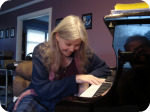 and hammers but not keys, and others that refer to the spirit and four-square swing of Erroll Garner.
and hammers but not keys, and others that refer to the spirit and four-square swing of Erroll Garner.
"Esperanza" sounds as Spanish as its name. It has deep voicings that might have been written by Granados or Rodrigo, and dance rhythms redolent of Central and South America. A recurring phrase in "Elaine" hints at love songs of more than half a century ago, but the piece opens into a thoroughly modern ballad. "Diane" is another original ballad in which Williams' delicacy of touch is a central element even as she builds intensity. In the Satie "Gymnopédie No. 1," a Bill Evans influence on Williams' interpretation is one color among many. Others are the blues and a brief Satie-like use of the pentatonic scale as in Japanese music. I know of no performance in which a jazz musician has explored the piece more thoroughly.
"Prophets" has the feeling of Coltrane in his late mystical period, with hypnotic modal figures in the left hand and flawlessly executed flourishes on top. Williams does not paint Coltrane's "Lonnie's Lament" with the melancholy he gave it as the final movement of his 1964 album Crescent. Still, she subtracts nothing of the piece's air of profound reflection and brings to it buoyancy that may be an indication of her new state of mind. She seems to have stepped fully into that next zone.
My guess is that this is the Glenn Gould clip that sent Jessica Williams into a new phase (see the first paragraph of the previous exhibit). It's from the documentary Art Of Piano. Gould is at home, fairly early in his career, working out on the Bach "Partita # 2."
Stefon Harris And Blackout, Urbanus (Concord). Harris is one of the brightest legatees of the vibraphone tradition glorified by Milt Jackson and such of his successors as Walt Dickerson, Cal Tjader and Bobby Hutcherson. The Jackson school  played an important part in Harris's development as a soloist. But, born in 1973, he came to maturity in the 1990s and is under the spell of not only bebop but also the pop culture of his time. The music he grew up with included gospel and R&B, standard inspirations for jazz musicians for decades. Harris was affected, too, by go-go, a funk offshoot that influenced early hip-hop; hip-hop itself; soul music; rap; and influences as diverse as Radiohead, Stravinksy and Stevie Wonder. The musicians in Harris's band, Blackout, are roughly his age. They think no more in categories than he does and wish to use their music to reach a generation of young people who are likely to find jazz too complex, too intellectual, too fuddy-duddy--the music of their parents and grandparents.
played an important part in Harris's development as a soloist. But, born in 1973, he came to maturity in the 1990s and is under the spell of not only bebop but also the pop culture of his time. The music he grew up with included gospel and R&B, standard inspirations for jazz musicians for decades. Harris was affected, too, by go-go, a funk offshoot that influenced early hip-hop; hip-hop itself; soul music; rap; and influences as diverse as Radiohead, Stravinksy and Stevie Wonder. The musicians in Harris's band, Blackout, are roughly his age. They think no more in categories than he does and wish to use their music to reach a generation of young people who are likely to find jazz too complex, too intellectual, too fuddy-duddy--the music of their parents and grandparents.
Grabbing the youngsters is an admirable goal, one that relates to web log discussions flaring up in the wake of a National Endowment for the Arts finding that the future of jazz is in danger because its presumed primary audience is aging. (For an interesting development in that contretemps, see fellow artsjournal.com blogger Howard Mandel, who is conducting a public experiment.) No matter how effectively Harris captures his target audience--and I hope he does--for serious listeners of any age the music is what matters. In Urbanus, there is much to like, not least Harris's rich arrangements for ensembles that expand his quintet to a medium-sized band. Harris's basic crew is alto saxophonist and vocorderist Casey Benjamin, bassist Ben Williams, drummer Terreon Gully, and Marc Cary, who plays piano, electric piano and assorted other keyboards.
As we have come to expect of him, Harris's playing is brilliant on both vibes and marimba. I keep going back to his quintet exposition of "Minor March," Jackie McLean's great contrafact on "Love Me or Leave Me." High points: Harris's quicksilver soloing, his compelling stop-time arrangement, Gully's not-quite-military drumming during what in another era might have been called a shout chorus, and an ending that brings the tune and the listener up short. There are riveting tempo, time and chord changes in Harris's "Blues For Denial," with heated improvisation by Harris and Cary. Working from and beyond the Gil Evans arrangement for Miles Davis, Harris takes Gershwin's Porgy and Bess anthem "Gone Gone Gone" into funk territory with splashes of electronic keyboards ameliorated by skillful voicings for flutes and reeds.
compelling stop-time arrangement, Gully's not-quite-military drumming during what in another era might have been called a shout chorus, and an ending that brings the tune and the listener up short. There are riveting tempo, time and chord changes in Harris's "Blues For Denial," with heated improvisation by Harris and Cary. Working from and beyond the Gil Evans arrangement for Miles Davis, Harris takes Gershwin's Porgy and Bess anthem "Gone Gone Gone" into funk territory with splashes of electronic keyboards ameliorated by skillful voicings for flutes and reeds.
The vocorder is described in the Urban Dictionary as "An electronic device used to alter the voice. Typically used by talentless 'musicians' to try and sound like they can sing." That is unfair, since its most celebrated user is Stevie Wonder, who is generally credited with being able to sing. Herbie Hancock and Joe Zawinul have also put the vocorder to good, if excessive, use. Benjamin uses it on Buster Williams's "Christina," a ballad so gorgeous that it would survive nearly any treatment. He also plays it on Wonder's "They Won't Go (When I Go)" and "For You," a ballad Benjamin co-composed with Sameet Gupta. I would just as soon have heard him play alto sax on those pieces; with continued exposure the vocorder's campy charm recedes. The soulfulness of Benjamin's saxophone commenatary over the ensemble on the concluding "Langston's Lullaby" is a bright facet of the album.
Harris melds his influences tastefully, employing pop elements to attract but not pander to his generation and maintaining substance for experienced jazz listeners. It could be a step toward getting both audiences to ditch labels and think of music as--music.
Sonny Rollins is 79 today. We celebrate the occasion by bringing you Rollins playing an extended version of a tune his mother remembered from her girlhood in the Virgin Islands. "St. Thomas" has been an essential and beloved part of his repertoire for more than 50 years. The rhythm section Is Kenny Drew, piano; Niels-Henning Ørsted Pedersen, bass; Albert "Tootie" Heath, drums. The video from 1968 seems to have been made in Denmark. Happy birthday, sir, and best wishes.
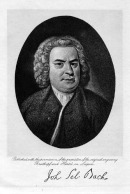 News flash: Johann Sebastian Bach may have been ahead of his time.
News flash: Johann Sebastian Bach may have been ahead of his time.
Eric Altschuler, a Bach researcher for more than a decade, was a guest today on National Public Radio's Morning Edition Sunday. He discussed with host Liane Hansen his proposition that Bach used a twelve-tone row a couple of centuries before Arnold Schoenberg revolutionized 20th century music with the device and, I might add, about 250 years before Ornette Coleman employed the atonal row in jazz. To hear the Altschuler interview, complete with musical examples, click on the single arrow in the player below.
There are countless recordings of The Well-Tempered Clavier. For years, I've been fascinated with the interpretations by the young Andras Schiff of Book 1 and Book 2.
If you're interested in going into Bach beyond listening, a recent book by the Canadian musicologist Marjorie Wornell Engells examines the musical language and emotional dimension of The Well-Tempered Clavier.
I suppose you could go through life without learning to love Bach, but I wouldn't advise it.
Listening to the Art Pepper CDs for the new batch of recommendations in Doug's Picks (center column) stimulated memories of time spent with Pepper not long before he died. The occasion was the basis of an article in Texas Monthly. Later, in slightly different form, it ended up as part of a chapter in Jazz Matters. Here it is as a bonus post--or as a marketing ploy for a twenty-year-old book that manages to stay in print--or as an excuse to show you an unusual picture.
Art Pepper's Last Chorus1982
Art Pepper had been quiet and a little sad all evening. But he grinned at the irony of posing for the Polaroid photographer in the Bourbon Street Jail. San Quentin was on his mind. He and his wife, Laurie, were in New Orleans on a book-plugging tour, and
everywhere they went he was asked about the years he had spent in prison on a narcotics conviction. What evolved into his autobiography, Straight Life, began as a series of cathartic tape recordings in which Pepper told Laurie everything he could recall about his unremittingly broken life. His memory was comprehensive, and he spared himself and his readers nothing.
Pepper's merchant seaman father was twenty-nine and his mother was fifteen when they were married. He was rarely at home after Pepper was born, and she was often drunk. Pepper learned to play the clarinet at nine, the alto saxophone at twelve. At seventeen, he had played in the bands of Gus Arnheim and Benny Carter and was working with Stan Kenton. After two years in the Army, he freelanced around Los Angeles, then rejoined Kenton in 1947. His reputation as a brilliant and original saxophonist became established.
By 1950, when he was twenty-five, Pepper was a veteran of the military, big bands, alcohol, pills and pot. That was the year he became addicted to heroin. He was first sent to jail on a narcotics conviction in 1953. From then until 1966 he spent more time in prison than out. After a short period of rehabilitation, during which he played with Buddy Rich's band, Pepper reached the depths. Sick almost literally unto death, in 1969 he checked himself into Synanon. There he met Laurie, who, along with methadone maintenance, proved to be therapy and salvation. He resumed playing and recording, and he regarded himself with wary realism. "I'm a junkie. And that's what I will die as--a junkie."
His account of the hell of his struggle with heroin puts into miraculous relief the beauty of his artistic achievement. From a childhood of rejection and neglect, Pepper had taken into manhood the only trustworthy and stable element he was to know in his first fifty years. Not until he met Laurie did he have another reliable anchor.
Pepper's expressiveness on alto saxophone has deepened and broadened, and his recordings after 1976 have been acclaimed as his finest. Finally lauded worldwide as a master soloist, he was, in his cautious way, basking in the recognition and the star treatment. At dinner, between waves of his customary reticence, Pepper allowed that his playing was at a keen edge he had been seeking for years. He said that at last he was often able to accept his performances. It's a nice memory of Art Pepper. At a sparkling table under the old ceiling fans at Arnaud's with the woman who helped him gain control of his life, he was content and smiling.
In June, he died shortly after suffering a stroke as he sat at their breakfast table chatting with Laurie. He was fifty-six.
For excerpts from Laurie Pepper's memoir-in-progress, go here.
Eddie Higgins died yesterday of lung cancer. Those who knew him called him by his given name, Haydn. He was a pianist of uncommon sensitivity, taste, subtlety and adaptability. He was equally accomplished and enthusiastic working with singers (his wife is Meredith d'Ambrosio), traditional bands (he unabashedly enjoyed the Sacramento Jazz Jubilee) and fiery young bebop lions (he wrote "Expoobident" for Lee Morgan and played on Morgan's album of that name).
wife is Meredith d'Ambrosio), traditional bands (he unabashedly enjoyed the Sacramento Jazz Jubilee) and fiery young bebop lions (he wrote "Expoobident" for Lee Morgan and played on Morgan's album of that name).
His admirer and sometime colleague Ben Riley, the drummer, said, "Eddie Higgins is on the same level of excellence as Hank Jones, Tommy Flanagan and the other grand masters of modern jazz piano." There is evidence on this CD with Riley and bassist Ray Drummond. Higgins worked about as much as he wished to, but was less well known in the United States than in Japan, where American jazz pianists are adored and Higgins had special standing. The Japanese summoned him frequently for tours and he recorded prolifically for the Japanese market. Some of the CDs he made for the Venus label are becoming available in the US; see this item in Doug's Picks.
There is surprisingly little of Higgins on video. This clip from the 2007 Sacramento festival gives an idea of his quiet, engaging ways and an appreciation of the harmonic life he breathed into everything he played.
Eddie Higgins, RIP
AJ Ads
AJ Blogs
AJBlogCentral | rssculture
Terry Teachout on the arts in New York City
Andrew Taylor on the business of arts & culture
rock culture approximately
Laura Collins-Hughes on arts, culture and coverage
Richard Kessler on arts education
Douglas McLennan's blog
Dalouge Smith advocates for the Arts
Art from the American Outback
Chloe Veltman on how culture will save the world
For immediate release: the arts are marketable
No genre is the new genre
David Jays on theatre and dance
Paul Levy measures the Angles
Judith H. Dobrzynski on Culture
John Rockwell on the arts
innovations and impediments in not-for-profit arts
Jan Herman - arts, media & culture with 'tude
dance
Apollinaire Scherr talks about dance
Tobi Tobias on dance et al...
jazz
Howard Mandel's freelance Urban Improvisation
Focus on New Orleans. Jazz and Other Sounds
Doug Ramsey on Jazz and other matters...
media
Jeff Weinstein's Cultural Mixology
Martha Bayles on Film...
classical music
Fresh ideas on building arts communities
Greg Sandow performs a book-in-progress
Harvey Sachs on music, and various digressions
Bruce Brubaker on all things Piano
Kyle Gann on music after the fact
Greg Sandow on the future of Classical Music
Norman Lebrecht on Shifting Sound Worlds
Joe Horowitz on music
publishing
Jerome Weeks on Books
Scott McLemee on books, ideas & trash-culture ephemera
theatre
Wendy Rosenfield: covering drama, onstage and off
visual
Public Art, Public Space
Regina Hackett takes her Art To Go
John Perreault's art diary
Lee Rosenbaum's Cultural Commentary
